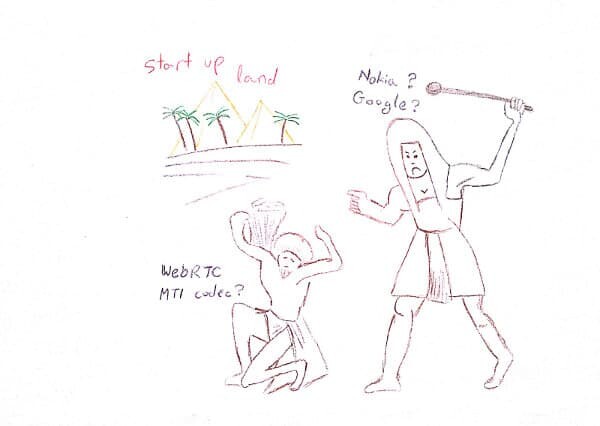It is Passover this week. Us Jews – we celebrate this holyday. It symbolizes freedom – the Jews were freed from slavery in Egypt.
Nokia is no Egypt, and Google/WebRTC doesn’t represent the Jews in this story. Concepts of freedom and openness do play a role in this story though.
Just two weeks ago I congratulated Google on the deal they stroke with MPEG-LA, paving the way for VP8 as the mandatory codec for WebRTC. And then came Nokia and asserted its position regarding to VP8 related patents. There are a bunch of patents there, that may or may not be relevant to VP8 – only time will tell. The interesting thing there is Nokia’s unwillingness to allow its patents to be used by a VP8 standard – with or without a royalty payment attached. In a way, Nokia is stating here that it is in the H.264 camp.
There are several lively discussions about the motives behind this move. The best ones can be found in Y Combinator’s Hacker News and Facebook WebRTC Forum group. Many are viewing Nokia as the culprit here, unwilling to embrace WebRTC. I almost believed this view fully, until I read Florian Mueller’s view on FOSS Patents:
I can relate to Nokia’s objections to Google’s quest for world domination. Google owns the largest video website, YouTube. It owns the market-leading smartphone and tablet computer operating system, Android. And above all, the leading search engine and online advertising business. A video codec standard of Google’s choosing — driven by a desire not to pay royalties to those who invested heavily over the years in technological progress in this area — is not a good idea.
Read Florian’s post in full. Revisit your worldview of openness and freedom after it. It isn’t easy to come to a verdict here – a lot harder than how it is being expressed around the web by commentators.
I can’t say I am a patent expert, a VP8 expert or a Nokia expert; so my views here are just that – views. As good as the next pundit in line; so here it goes:
- This has nothing to do with Microsoft and everything to do with Google
- Microsoft is adopting WebRTC, with modifications if you will; but for them, I believe WebRTC is a done deal. They have their assets to think about (Skype and Lync), but if they play their cards right, they will end up as one of the benefactors of WebRTC
- Nokia has nothing in WebRTC. Or RTC at all. They rely on Microsoft for Skype. On carriers for GSM and VoLTE, so for them WebRTC is just another vehicle – they should probably be indifferent to its success or failure
- On the video coding front the story is different. Nokia has considerable H.264 assets – research, development, knowhow, deployed hardware. In VP8 they are asset-less. To gain an edge or at least level the playing field against Android devices, they need WebRTC to support H.264 and not VP8
- And it is one of many pot shots that Google and Nokia are throwing around in the fight over mobile dominance
I had the questionable joy of patent licensing/litigation in the past. It was around mobile video telephony (3G-324M. It included standardization bodies and coalition building. At the time, I was on the brighter side of Nokia and on the bad side of Qualcomm. It was rather pathetic: two small companies (mine was one of them) got caught in the maelstrom of these two giants.
A similar but much larger maelstrom is upon us now. The likes of Google and Nokia are running the show, and in the middle is the MTI video codec of WebRTC with many small startups hanging in the limb for a decision.
–
Have a joyous Passover and a Happy Easter!


Making VP8 MTI is very dangerous. Some time ago, the claim was that there was no IPR on VP8. Then the claim was only Google had it and they were going to license it freely or with reciprocity agreements. I said then that there were probably others out there with IPR and they just have not said anything. It took a while, but now there are several companies that have claimed IPR. How many more are there? Who knows. Something to consider is that none of these companies are required to make any IPR declarations on VP8, either. So, Nokia or anyone else making claims would actually be doing us a favor. Still, there are those who are likely remaining silent.
Should VP8 become mandatory, Nokia might be forced to implement it. This actually puts a lot of risk on them, too. There are hundreds, if not thousands, of people who worked on H.264. There are many patents on H.264 and many more that cover closely-related video coding techniques. Just one or a few of those people demanding an award for damages related to VP8 would be horrible for the industry and horrible for Nokia.
Where things are now, we know the IPR holders on H.264, but we do not know the IPR holders on VP8.
Paul,
I am not sure I agree. H.264 might have MPEG-LA, but they are not the only patent holders. This makes licensing complex and expensive for H.264 as well.